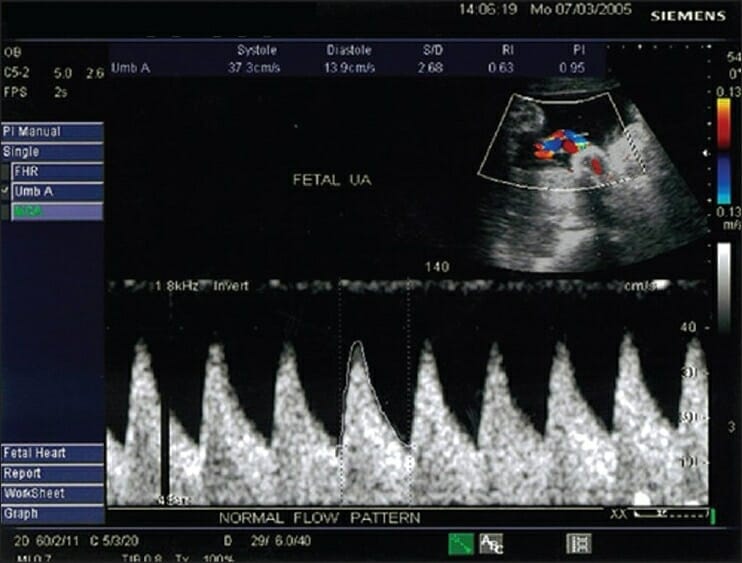Playlist
Show Playlist
Hide Playlist
Antenatal Care: Routine Labs
-
Slides RoutineLabs Obstetrics.pdf
-
Download Lecture Overview
00:01 So now let's discussed routine screening in pregnancy. 00:04 So here's a case. 00:06 A 23 year old G1 P0 intrauterine pregnancy at 8 weeks and 5 days presents for her initial prenatal visit. 00:15 Which of the following test would you not order as part of her routine pintail prenatal labs? A. Complete blood count. 00:23 B. Maternal serum alpha-fetoprotein. 00:26 C. Blood type and Rh factor. 00:29 or D. Human immunodeficient Virus (HIV) status. 00:32 Let's go throughout the lecture to find that answer. 00:36 So initial prenatal visit routine screening this is actually discussed in another lecture slide. 00:42 But we'll go through this briefly. 00:44 First, blood type and Rh factor. 00:46 We do want to know a patient's blood type and if they are Rh negative or Rh positive. 00:52 Why is that? Well if the patient is Rh negative and the baby, remember whose blood type we don't know is Rh positive. 00:58 Mom can make antibodies against positive blood types and during her next pregnancy if that baby is positive, those antibodies will go and attack that pregnancy. 01:08 So we want to know that we can do preventive things during the pregnancy, so that those antigens and antibodies don't cross. 01:15 So complete blood count. 01:18 We want to establish a normal hemoglobin hematocrit for the beginning of pregnancy. 01:22 Because we do know that physiologically, pregnant women do experience anemias. 01:27 So we want to know where they are starting. 01:29 So during our initial prenatal visit routine screening, there are some infections that we need to screen for. 01:35 Let's talk about these in a little detail. 01:38 First is rubella. 01:39 Now most women are rubella immune because they did receive vaccinations as children. 01:44 However, sometimes even with the vaccines, we do not build up the immunity to rubella. 01:49 And to contract rubella during pregnancy can means some adverse outcomes for the fetus. 01:53 So it is recommended we screened to determine if the patient is rubella immune or non-immune in the 1st trimester. 02:00 Unfortunately, if they are non-immune, we're still not able to give the vaccine until after the delivery. 02:06 For HIV, the CDC says that 50,000 people will be infected by HIV every year. 02:13 So it is recommended that all pregnant women get screened as part of their initial prenatal visit. 02:18 If they are on a risk an area that's high risk for HIV or if they participate in behaviors that will increase their risk of contracting HIV, it is recommended that they also get screened in the 3rd third trimester, because of the affects it can have on the fetus. 02:31 Moving on from there is recommended that all women get screened for syphilis through the RPR or VDRL in the 1st trimester. 02:41 If they are in a high risk area for contracting syphilis, it's recommended they get screened in the 2nd and 3rd trimester as well. 02:49 And for hepatitis B. 02:50 Because of the risk of transmission to the fetus, it's recommended that pregnant women get screened for hepatitis B at their initial prenatal visit. 02:58 And for hepatitis. 02:59 Because of the risk of transmission to the fetus, ACOG recommends that pregnant women not only get screened for hepatitis B, but also for hepatitis C at their initial prenatal visit. 03:11 Now also as part of the initial prenatal visit screening, if the patient has not has a pap smear in the last 3 years and they are 21 years old, it is recommended they get pap smear for their baseline labs. 03:25 As well as cultures for gonorrhea and chlamydia. 03:28 Women should also be screened for hemoglobinopathies and genetic diseases. 03:34 In particular African American women, they should be screened for sickle-cell trait. 03:39 For Ashkenazi Jews, they should be screened for canavan's disease. 03:43 For Caucasian women they should be screened for cystic fibrosis. 03:50 So back to our question A 23 year old G1 P0 intrauterine pregnancy at 8 weeks 5 days presents for her initial prenatal visit. 03:59 Which of the following labs would you not order as par of her routine initial prenatal labs? A. Complete blood cell count or CBC. 04:09 B. Maternal serum alpha-fetoprotein. 04:11 C. Blood type and Rh factor. 04:14 or D. Human immunodeficient Virus (HIV) status. 04:17 The answer is B. 04:19 Maternal serum alpha-fetoprotein. 04:21 This is not part of the routine screening lab. 04:26 Now, let's move on for screening for Down syndrome. 04:29 We're going to discuss this in great detail in another lecture. 04:33 But it's important to know that while women of advance maternal age are at increased risk for having an infant with Down's syndrome, all women should be offered screening in the 1st trimester. 04:45 So there are other routine screening test that are done through pregnancy. 04:48 One is the anatomy ultrasound. 04:50 This is done between 18 weeks and 22 weeks gestation. 04:53 And at this anatomy ultrasound, we look at all structures of the fetus to make sure they are within normal limit. 04:59 We look at the brain. 05:00 We look at the heart, the intestines. 05:03 Again, looking to see if there is any structural abnormalities. 05:07 Screening for gestational diabetes. 05:09 Now we have a look whole lecture that's devoted to gestational diabetes. 05:13 But into keep with our theme and discuss about how we screen for it, this is done between 24 and 28 of weeks of pregnancy. 05:20 In the states, we do the 50 gram glucola test. 05:23 And if a patient has a random glucose level of 140 milligrams per decaliter, they are considered to have a positive screen for gestational diabetes. 05:31 Though I should mention one caveat based on current guidelines, individual testing centers are given the freedom to set their own individual positive threshold, which is usually between 130 and 140. 05:43 And this is really based on their patient population and the prevalence of the disease. 05:48 So any value over 140 is considered a positive screen, and certain patients may also get a positive screen with values slightly lower. 05:58 And then you need the confirmation test which is a 3 hour test. 06:01 In this test, they come and get fasting blood sugar. 06:05 Drinking 100 gram glucola test and they have blood sugar at 1 hour, 2 hours and 3 hours. 06:12 If they have two values out of those four lab values that are abnormal, they have gestational diabetes. 06:18 Now for women that are Rh negative, again we discuss the ill affects that can happen in a pregnancy when a patient is Rh negative. 06:29 And some of the preventive measures that we do. 06:31 We give Rhogam at 28 weeks to again help bind those antigens. 06:36 Since antibodies don't form against an Rh positive fetus in the next pregnancy. 06:41 So this is not a screening test, but this is something that's also recommended for pregnant women. 06:47 That's the pertussis vaccination. 06:49 Because there's been a resurgence of whopping cough, the CDC recommends all women get that vaccinated for pertussis in the 3rd trimester. 06:57 And they're able to pass some of that immunity on to the baby. 07:00 Now lastly, we screen for group B beta streptococcus for GB s at 36 to 38 weeks. 07:07 Historically, we have screen for GBS between the gestational ages of 35 to 37 weeks. 07:14 However, ACOG and CDC have recommended that we now screen later in pregnancy beginning at 36 weeks because we are allowing our mothers to continue their pregnancy until 41 weeks. 07:28 For a mom that has a delivery at 41 weeks. 07:31 If she is screened at 35 weeks, that culture is no longer valid. 07:37 So for this reason, ACOG and the CDC have recommended that we delay screening until 36 weeks. 07:43 Now GBS is a bacteria that's part of the normal vaginal flora. 07:47 However, if it's not treated during delivery time, specially a vaginal delivery, then the [?] can contract this disease and it can lead to meningitis or pneumonia. 07:57 So it's very important to know if a patient is positive for GBS so that they can receive the appropriate treatment.
About the Lecture
The lecture Antenatal Care: Routine Labs by Veronica Gillispie, MD, MAS, FACOG is from the course Antenatal Care. It contains the following chapters:
- Routine Screening in Pregnancy
- Initial Prenatal Visit Routine Screening
- Routine Screening Throughout Pregnancy
Included Quiz Questions
A 20-year-old G1P0 woman at 6 weeks 6 days gestational age presents to your office for her initial prenatal visit. Which of the following tests is NOT part of her routine screening at this first-trimester visit?
- Group B Streptococcus screening
- Blood type
- Rh factor
- Complete blood count
- HIV screening
What routine screening test is done for all pregnancies between 18 weeks and 22 weeks gestational age?
- Anatomy ultrasound
- Maternal serum alpha-fetoprotein level
- Anti-D level
- Salmonella vaccination
- Rectovaginal group B beta-streptococcus screening
Why is Rhogam given to an Rh-negative G1P0 patient at 28 weeks gestational age?
- Rhogam protects a subsequent pregnancy from maternal antibodies against Rh-positive blood type.
- Rhogam protects the current pregnancy from autoimmunity against Rh-positive blood type.
- Rhogam protects the current fetus from also being Rh-negative.
- Rhogam protects the mom from Rh-positive blood type.
- Rhogam protects the mom from fetal antibodies.
When is it recommended for pregnant women to receive the pertussis vaccination?
- During the third trimester
- During the first trimester
- During the second trimester
- At preconception counseling
- After delivery
When should a pregnant woman be screened for recto-vaginal group B beta streptococcus?
- Between 36 and 38 weeks of gestational age
- At 40 weeks of gestational age
- Between 10 and 12 weeks of gestational age
- During the first AND third trimesters
- Between 24 and 28 weeks of gestational age
Customer reviews
5,0 of 5 stars
| 5 Stars |
|
2 |
| 4 Stars |
|
0 |
| 3 Stars |
|
0 |
| 2 Stars |
|
0 |
| 1 Star |
|
0 |
very resourceful for routine labs . i found it necessary and helpful
very helpful but it would be more if there is a more vivid descriptions




